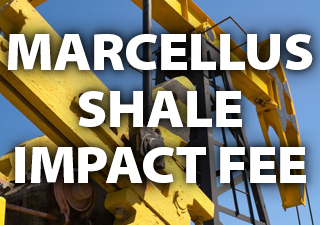Media
House to Vote Marcellus Impact Fee
 The Pennsylvania House of Representatives is expected to vote on HB 1950 today, which would enact an impact fee on “nonconventional gas wells,” largely aimed at Marcellus Shale gas drilling.
The Pennsylvania House of Representatives is expected to vote on HB 1950 today, which would enact an impact fee on “nonconventional gas wells,” largely aimed at Marcellus Shale gas drilling.
The impact fee language in HB 1950 closely follows the Governor’s proposal. You can read our assessment of that here.
Under the bill, counties decide whether to impose a fee or not, and how much the fee should be, up to a set maximum. This allows counties to determine if local governments are bearing costs not being paid for with current taxes and fees, and to set the rate accordingly. It also ensures competition between local governments, discourages excessive fee rates, and reduces the threat of cross-subsidization and redistribution of fee revenues to unrelated purposes, and is in keeping with our principles that should guide an impact fee discussion.
This represents a less onerous fee than that imposed under the Senate plan, which passed this week. That bill cannot become law in its current form, as revenue bills must originate in the House under the state constitution. But the Senate bill imposes a set fee statewide, would increase the “fee” with gas prices, and would first distribute $13 million to state projects and then keep almost half the remaining revenue at the state level. In other words, it is a tax.
HB 1950 needs to be improved to be a true fee, and not be a tax by another name. The “impacts” the bill ties to a fee are currently too broad, and include things that are not direct costs of drilling or should be funded through general taxes and fees, as they are “impacts” not of gas drilling only, but of trucking or population growth. And given the amount of money the industry is already putting towards infrastructure, there should also be a credit for companies that are already paying for those impacts. Otherwise, the fee could encourage companies to stop voluntarily rebuilding roads, a concern raised by many local residents and officials.
HB 1950 will not likely be the final version of what reaches the Governor’s desk, but it moves the discussion forward to allow Governor Corbett to keep his promise to voters not to raise taxes, and work toward a final piece of legislation that embraces the principles we laid out when this debate began.